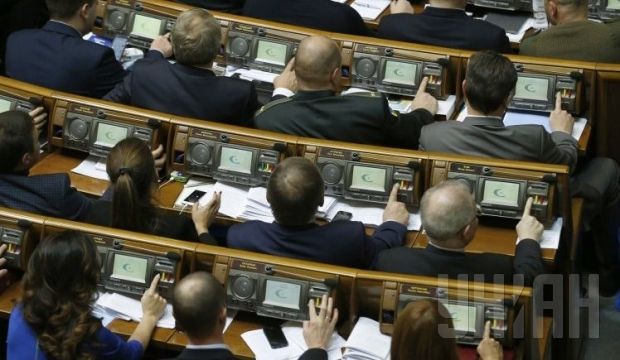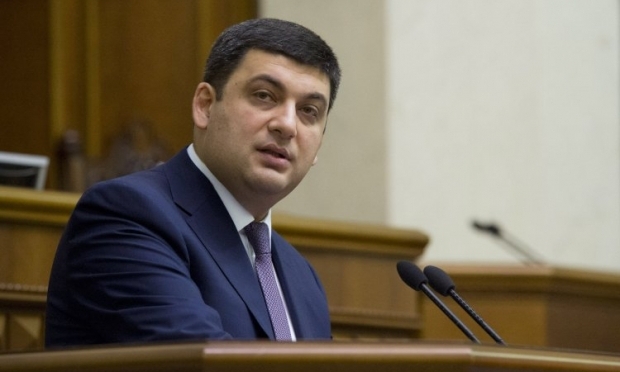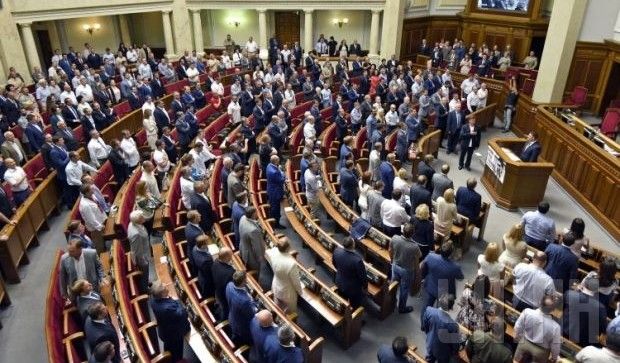
"Reform" of Rada
Having vowed to the Europeans to implement a pile of reforms, Ukrainian people's deputies are finally set to return to plenary work next week. However, amid the expected ups and downs of yet another “Coalitiongate” and the attempts to agree on a new composition of the Cabinet, the Parliament is unlikely to have any time left for reforming itself.
A year ago, Speaker of Parliament Volodymyr Groysman spoke about the need to develop a special code of conduct for MPs, to assist in the fight against truancy, brawls, and other violations at the session hall. In fact, there was no real need in such document given the rules of behavior of most types of officials has long been spelled out in a number of laws. However, this never stopped the officials from violating these rules. The Code has not been drafted in the past year, but today, the idea of the need to adopt it has resurfaced, became one of the recommendations of the European "Road Map" for reforming the Rada.
The representatives of the special mission of the European Parliament to Ukraine on reforming the Verkhovna Rada, headed by Pat Cox, have visited Kyiv nearly hundred times in a few months, rightfully pointing out that, in the course of these visits, they saw in the parliament a lack of discipline, lack of respect for the Speaker, misunderstanding of and failure to comply with legislative procedures, lack of understanding of the role and powers of the Verkhovna Rada committees. EP mission also recorded non-personal voting, the use of the people's deputy status with the aim of affecting the interests of individuals, total lack of transparency in finances or business interests of the MPs, as well as getting into Parliament of some deputies solely for the sake of obtaining parliamentary immunity...
To solve these problems, concerned Europeans have drafted a high-quality "Road Map," based on the successfully implemented international practices. The Ukrainian Parliament was offered 52 recommendations for improving its work.

The document is actually pretty good. It’s just implementing this reform in the Ukrainian reality is unlikely for several reasons.
Recommendations for the distant future
Firstly, this is because some of the recommendations are contrary to the Constitution and cause indignation already at the stage of proposals. They require changes in the Basic Law (which today’s Rada is hardly able to adopt). For example, they include a recommendation to introduce a simple majority vote for the "ordinary" laws if there is a quorum.
That is, if there are 226 MPs at the session hall, they can adopt laws by a majority of those present (in Ukrainian reality, it is likely that such a vote will be held by the majority of voting cards, not of the MPs). At the same time, the mechanism of an absolute majority, according to MEPs, should be preserved for the "special" laws, such as: Constitutional amendments, or when it is necessary to take into account international experience.
Actually, these innovations are unlikely to discipline parliamentarians and make them come to work on all the days of plenary sessions. The recent research by OPORA civic network indicates that only 150 MPs do legislative work on a regular basis.
In addition, it is necessary to understand that such changes require amendments to the Constitution, which clearly defines the conditions under which the law shall be considered adopted by the Rada. "Another interesting point must be considered in this recommendation – the legal incident,” said political expert, managing partner of the National Anti-Crisis Group Taras Zagorodny. “In the national legislation there is a clear number – 226 votes. The existence of the Coalition is tied to this number."
In other words, the offer of the Europeans means that the laws can be voted for by a "non-coalition" majority. This, in turn, allows at any time to cast doubt on the existence of a parliamentary Coalition, which, as of today, must consist of at least 226 "bayonets."
Not to mention the fact that it needs to be determined, what laws are "normal," and what laws are "special." "These things should be clearly defined in the legislation. Since in the current form, such proposals in the "Road Map" are contrary to the Constitution," said Professor of Law, constitutionalist Viktor Musiyaka.
"I'm also not quite sure whether the proposal is right to select after the start of each new session 20 bills initiated by the People's Deputies, for further consideration by the Verkhovna Rada. Firstly, why only 20? Why put up such limitations? And, secondly, the legislative initiative in Ukraine belongs to the MPs, the Cabinet, and the President. And, if such recommendations are implemented, it will turn out that the main subjects of the legislative initiative will only be the Government and the President," he said.
The expert was also surprised by the recommendation, involving the formation of the agenda in closed sessions. "Eliminating media presence [from this process] is unacceptable! The Parliament is a representative body!" said the expert.
No laws apply to the deputies?
The second point, which raises doubts as to the successful implementation of the reform of the Verkhovna Rada, is that a number of the recommendations of the EP to the Ukrainian colleagues are already spelled out in national legislation. "In general, I view these proposals positively. But there is some misunderstanding related to incorrect translation [English to Ukrainian] or the fact that the mission is not fully aware of a number of laws, in particular of the Regulations of the Verkhovna Rada, or the law on the status of people's deputies ... As a result, the EP offers us to introduce some provisions that we already have. It’s just that the parliament’s leaders or the deputies don’t use them," said Viktor Musiyaka.

For example, there is the section on the political supervision (control) over the executive branch of government. According to the current Ukrainian legislation, today’s control structure over the executive branch is fully consistent with international standards, said Viktor Musiyaka. In addition, the expert believes a misunderstanding an offer to provide the Rada Speaker (or his deputy) with the right to exclude from participation in plenary sessions of the deputies for misbehavior "that has signs of violence or is intended to disrupt the work of parliament." "The fact is that we already have these norms, but the Chairman of the Verkhovna Rada and his deputies don’t use them," he said.
And this is only a small part of the rules that EP recommends to the Ukrainian deputies, who have long turned a blind eye to the fact that these rules have long existed in national legislation.
Non-operating system
The third factor that does not allow believing in the success of the reform of the Rada is that some of the proposals can be implemented only if there is the political will of all branches of government. Unfortunately, in the current political crisis amid formal lack of coalition, the Verkhovna Rada is unable to vote for any significant changes. "It's not a problem of Cox's mission. The Europeans have proposed what they thought fit. But they didn’t account for the Ukrainian reality," says Yevgeny Magda, political scientist, director of the Center for Public Relations.
According to him, the European experiment "to turn Ukraine into a civilized country with a civilized parliamentary systemt" under the current circumstances of the parliamentary crisis is similar to the situation when a person is at the hospital with a third heart attack thinking about some dental upgrade. "This initiative will not influence the exit out of the political crisis. This is a classic example of good intentions, which, of course, can become a reality, but there are lots of nuances," he said.
According to the expert, the Parliament needs other things today, like changing the shape of elections to the Verkhovna Rada, switching to the open electoral lists, possibly reducing the number of MPs. "But in the current form, Parliament is not able to accomplish it," he said.
Besides a notorious Electoral Code, where the MPs have pledged once and for all to spell out the unified rules of the game for election campaigns, another example of how the parliament obstructs its own change is the settlement of the status of the parliamentary opposition (one of the recommendations of the EP).
Several bills have already been submitted to the Rada regulating activities of opposition. According to Viktor Musiyaka, settling this issue does not even require a separate law. Modifying the Rada Regulations would suffice. "The Regulations can determine all of the factors for ensuring the rights of opposition, so that there is no dispute in the future, regardless of the composition of the parliament," he said.
At the same time, the expert notes that in the current circumstances, this could be a problem, because today, no one is surprised by the fact that the coalition members suddenly become the opposition. "That is to say, in the Verkhovna Rada today, there is some kind of a fragmented opposition. Those who broke away from the coalition do not agree with the opponents who were the opposition to the current parliamentary majority initially after the election. And, in this case, who should be considered "real" opposition in Parliament? That is why the Regulations need to clearly spell out, what the opposition is, how it is formed, what the base is for its formation, and what rights it has in Parliament, etc.," said the expert.

Thus, the list of EP recommendations includes not so many of those worth to be considered as soon as possible. For example, they relate to e-management, transparency, and the need for civilizational control. The rest of provisions are already spelled out in Ukrainian laws and in the Verkhovna Rada, one way or another. In fact, nothing prevents quality work of the Rada. It turns out that it is the ambitions of certain parties and their leaders that must first be reformed, as well as the culture of the national domestic political forces.
In the end, politicians need to understand what has long been stipulated by the Constitution of Ukraine: Parliament must operate independently from the president or the prime minister's interests. All branches of power should cooperate. But the Verkhovna Rada cannot be in opposition to the government, which it has earlier approved. And it cannot and must not vote "upon a call" from the Administration of the President. In order for the system to work this way, Ukraine has already adopted plenty of good laws. The only thing lacking is the political will to fulfill them.
Tatiana Urbanskaya

